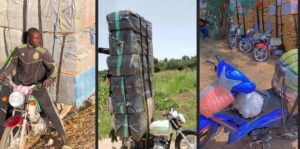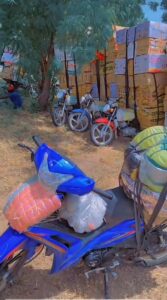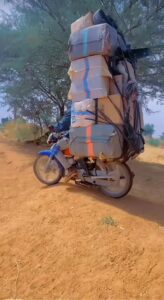The outlets and network of insurgency groups, invariably thrives on paddles of uninterrupted proliferation of smuggling of resources for survival. This is but the center of gravity of a more than a decade old insurgency campaign in the Northeast.
The network of proliferation and smuggling are tied to established strongholds, links and machinery of motions like couriers and spies who live by means to evade detection.
Despite means to curtail the nuisance, a persistent and sustained insecurity in the Lake Chad Basin is being threatened by exacerbated form of an intricate network of smuggling and illicit activities alongside funds and a strong ideological base that aids support to provide essential supplies to terrorist groups such as Boko Haram factions.
These networks, stretching across the Nigeria, Chad, Cameroon, Niger, the Sahel and greater SAHEL which have become disturbing, ugly and notorious lifeline for insurgency, enabling groups linked to global terrorist organisations to sustain their operations and pose significant threats to National Security always and to the wider regional stability.



The smugglers transport food, fuel, arms, and even uniforms to insurgent camps through a carefully mapped routes. Observably to be precise in the heart of the extreme north of the Cameroons, villages like Bulgaram, Cikka, Guma, Maltam, Doron Liman, and Ramin Dorina serve as critical transit points for supplies destined for terrorist-controlled areas.
This maintains an uninterrupted supply to outlets in Marte, Gamboru Ngala, Bama, Dikwa Local Government Areas areas amongst others in Borno State as well established a hub for food supplies funneled from Cameroon’s the Darak village and also amongst others. These supplies are often moved under the cover of night, leveraging market activities in towns like Kinchendi to obscure the illicit trade.
Borno state is bordered by Chad, Niger and Cameroon. With Kukawa and Abadam local government areas of the state bordering Tchad-Abadam, Mobbar bordering Niger Republic and Gamboru, Kala Balge, Bama and Gwoza bordering Cameroon. The hinterland axis provided the route for easy movement of weapons to the terrorist cells in Nigeria as well as fuel supplies.
Equally, the waterways and island lands provide the strategic location to facilitates the group movements on flying boats to enable them reach the terrorists locations with ease. These activities have recorded increase in recent times due to the withdrawal of the MNJTF maritime operation contingent in Darak. Similarly, Fuel and arms smuggling are equally rampant, with supplies transported from Kaula village in Niger to Tumbum Jaki, a notorious insurgent stronghold.
Smugglers often use firewood sellers and livestock transported in trucks as cover, allowing insurgents to blend into local communities. In Nigeria, towns like Jakana, Minok, Banishaik, Babangida, and Gaidam in Yobe State, as well as Hadejia in Jigawa State, are key points for distributing smuggled goods, fuel and arms including motorcycles used by terrorists for mobility.
Beyond logistical support, the insurgents have established revenue-generation networks. These include taxing local smugglers and merchants in areas like Gegime, Niger Republic, and engaging in fish and livestock trading through towns like Hadejia, Jigawa State as well as the sale of livestock from the Lake Chad through MONGUNO town, going to other parts of the country. This income is funneled back into their operations, perpetuating the cycle of violence and instability.
ISWAP have also have maintained a logistical support base in Kano, where agents of Bereau de-Change and other collaborators received money on behalf of the insurgents to fund activities of the insurgents in the Lake Chad. Other networks are domiciled in Maiduguri, Borno capital.
Escape routes for terrorists and collaborators also highlight the sophistication of these networks. Using points in Niger Republic such as Gigeme, or Cameroon villages like Mokolo and Bulgaram, insurgents disguise themselves and infiltrate Nigerian towns, including Madagali, and Mubi in Adamawa State, and cities like Kano and Abuja, often starting new lives or regrouping for further attacks. In many cases, they are transported through trucks conveying livestock that is heading to other part of the country.
The scale of this smuggling underscores the urgent need for coordinated action. To dismantle these networks security agencies must enhance surveillance along identified smuggling routes in Nigeria, Cameroon, and Niger. Regional collaboration between Nigeria, Cameroon, and Niger is essential. Joint task forces and intelligence-sharing mechanisms can help track smugglers and cut off supply chains to terrorist groups.
The growing sophistication of smuggling networks in the Lake Chad region not only fuels terrorism but also undermines national security. A comprehensive and sustained effort is required to dismantle these operations and restore stability to the region. The time to act is now, before these illicit activities further entrench themselves as a permanent fixture of insecurity in the Sahel and beyond.
Zagazola Makama is a Counter Insurgency Expert and Security Analyst in the Lake Chad Region


